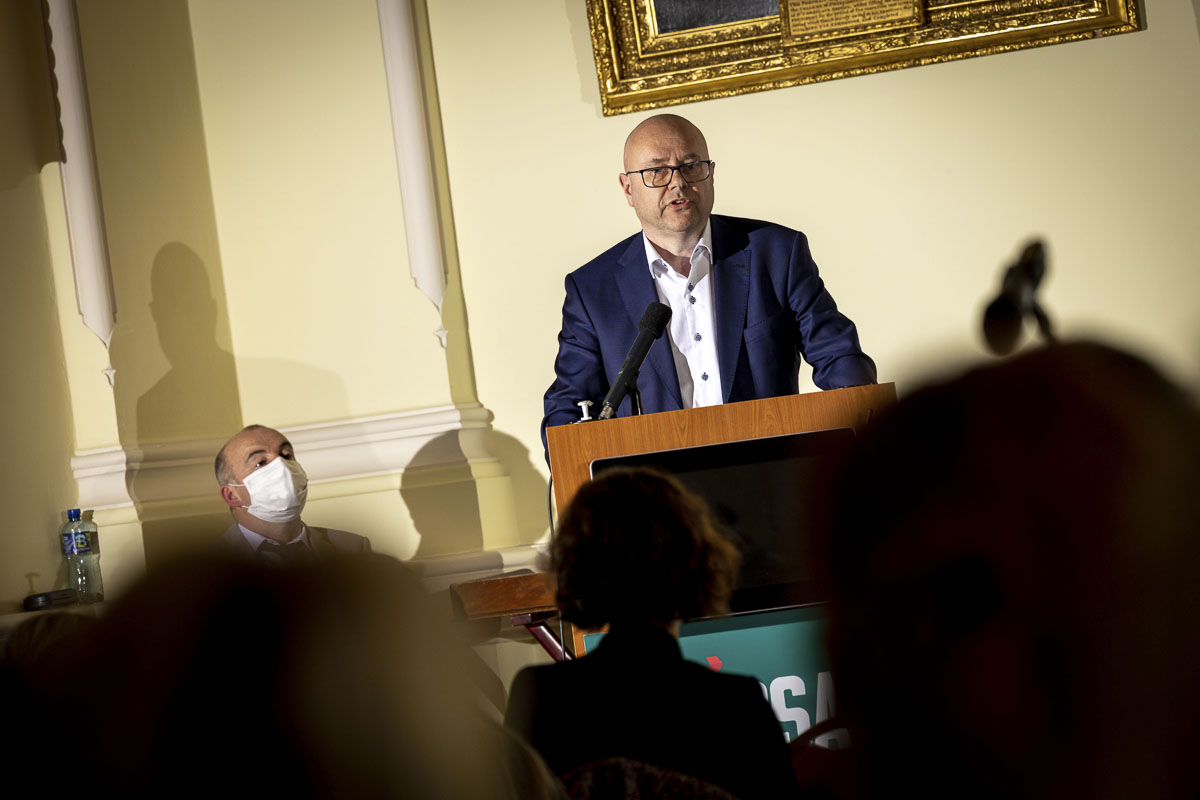The School Completion Programme (SCP) marked 20 years of service, to young people at risk of early school leaving, at an event today addressed by An Taoiseach, Micheál Martin and the Minister of Education Norma Foley. The programme offers an extensive array of in-school, after-school, out-of-school and holiday period support services aimed at enhancing pupil participation in education.
Introducing An Taoiseach, the serving Minister for Education when the establishment of the SCP was first authorised, Fórsa general secretary and president of the Irish Congress of Trade Unions (ICTU) Kevin Callinan said the programme has achieved some of the best outcomes for disadvantaged young people in the EU, but remains “on the margins of a stretched national education effort.”
We will need to do much more to adequately meet the needs of the young people for whom the school completion service is an essential pathway to fulfilling their education and life potential.
Kevin said this was despite recent modest improvements in funding, which he described as a first step in restoring the programme from deep cuts imposed during the financial crisis: “We will need to do much more to adequately meet the needs of the young people for whom the school completion service is an essential pathway to fulfilling their educational, and life, potential,” he said.
The programme coordinates school-based, tailored interventions that target pupils most at risk of developing the kinds of social, emotional and behavioural difficulties that hinder academic achievement, and the experience of engaging positively in the educational environment.
Commitment
Chair of Fórsa’s SCP branch, James Kavanagh, an SCP coordinator in Swords, Co. Dublin, said the event was designed to celebrate the service and the positive culture of the School Completion Programme developed over its first two decades: “Many of the SCP’s coordinators and project workers across the country have been with the programme since the beginning, which reflects the depth of commitment of Fórsa members to providing this crucial service.
“Our members have maintained delivery of these services to vulnerable young people despite some serious setbacks, including cuts to our funding in 2009 which have yet to recover. Demand for our services grow every year, and the post-Covid school environment is full of new challenges to young people in education. Over the 20 years of the service we can see the positive impact that the service has had for children in our schools.
We are now becoming accustomed to hearing from former students who are able to tell us the difference the programme made to their experience of education.
“We are now becoming accustomed to meeting former students who, as adults, are able to tell us the difference the programme made to their experience of education.
“We remain committed to providing the support they need, and our objective as a union branch is to ensure that government and funding bodies make the resources available,” he said.
The symposium included presentations by Dr Emer Smyth, drawing on findings from a large-scale study of SCP conducted by the ESRI, examining the potential for SCP to support student wellbeing in the wake of the COVID-19 pandemic.
Dr Deirdre Mc Gillicuddy addressed the symposium on “empowering and transforming young people’s lives through the relational“ through the 20 years of the programme, and Dr Paul Downes presented on the role of SCP in supporting mental health and emotional wellbeing.
Governance
The programme was devised by the Social Inclusion Unit of the Department of Education in 2002 and transferred to the Department of Children and Youth Affairs in 2012. In 2014, operational responsibility for SCP was transferred to Tusla.
In 2020, it was announced that SCP would return to the Department of Education, along with the Home School Community Liaison Scheme and the Educational Welfare Service. The move back to the Department of Education was welcomed by Fórsa, which had campaigned for its return over a number of years.
However, the union’s head of education Andy Pike, in his address to the symposium, said no formal consultation with Fórsa on the transfer has yet commenced, and said it remains unclear if the department will take a more active and involved role in the oversight and operation of programme.
Responding to Minister Foley’s address to the symposium, Andy said the government must implement measures to create clear and consistent governance and employment structures for all SCP projects, as per the recommendations made in the ESRI’s review of the programme, published in 2015.
The full text of Kevin Callinan’s speech is available HERE.
Pleased to mark 20 years of the School Completion Programme with @forsa_union_ie.
I want to wish the young people involved today every success – and thank all involved in this programme over the years. pic.twitter.com/qqtMzr1WBp
— Micheál Martin (@MichealMartinTD) March 30, 2022

